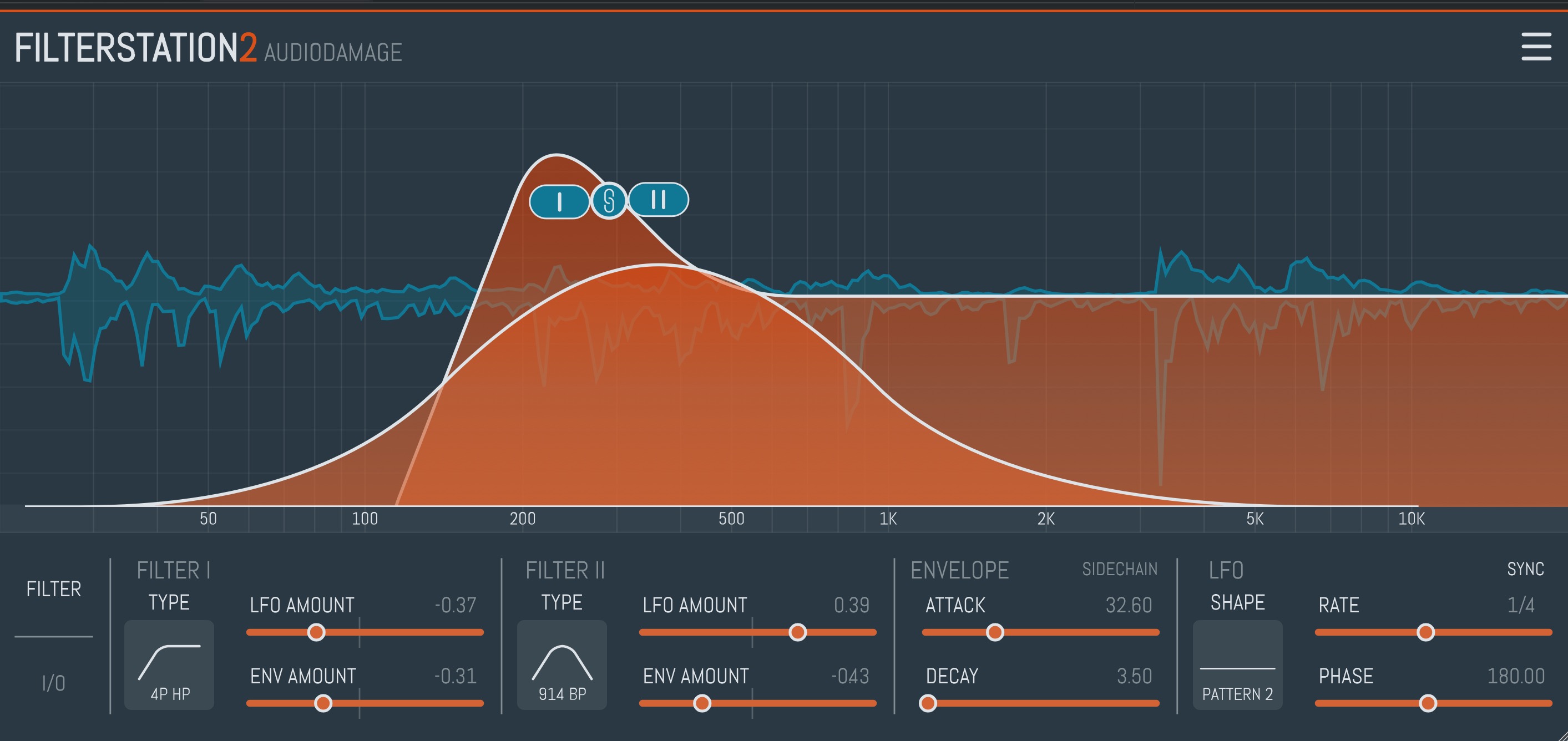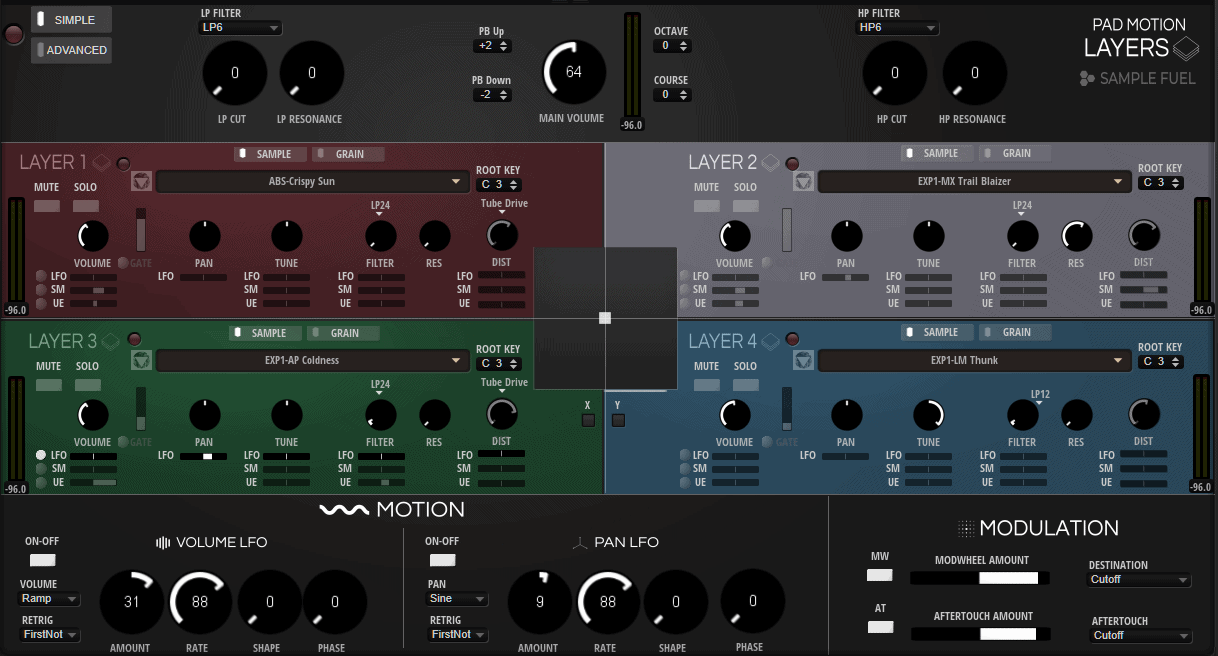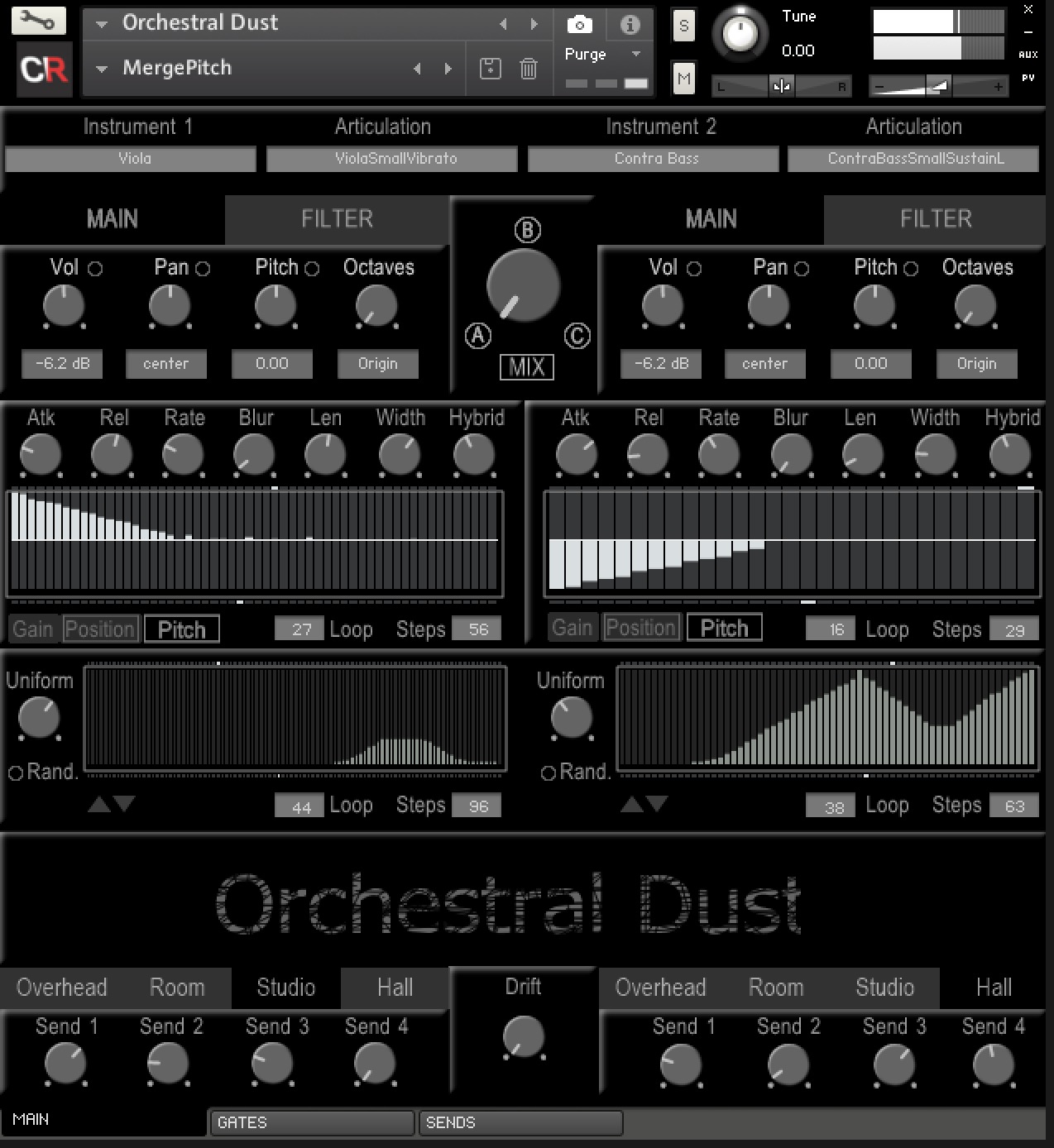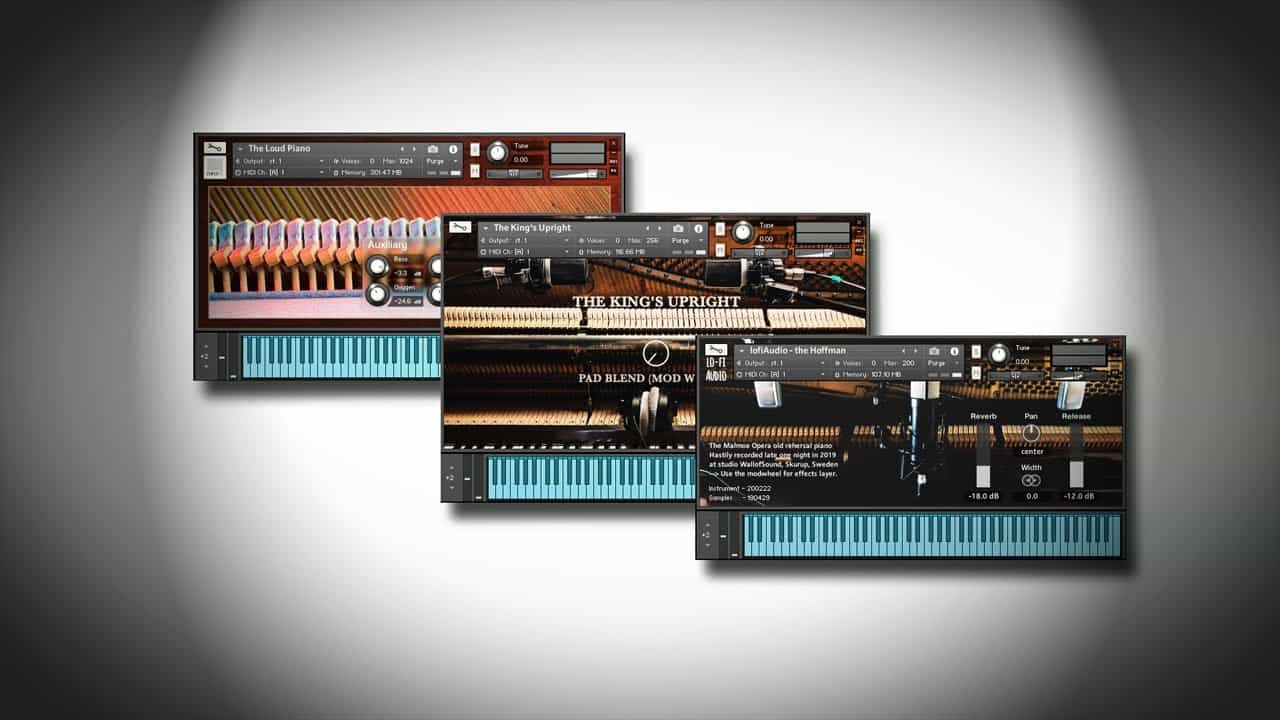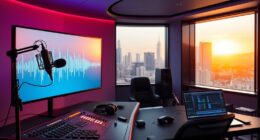V Collection 6 by Arturia Review
Arturia has released V Collection 6. With the update to version 6, four hardware synths and instruments have been added. Besides new preset sounds, upgrades to Piano V (now version 2), Analog Lab and enhancements to the existing instrument have been made. One of the most exciting new synths is the DX7, besides other cool famous synths for you to play with. You get the total to 21 instruments including Buchla Easel V, CMI V, Clavinet V. Overall you get Analog Lab, Clavinet V, CMI V, DX7 V, Buchla Easel V, Synclavier V, B-3 V, Mini V, Piano V, Stage-73 V, Matrix-12 V, Farfisa V, Solina V, SEM V, Wurli V, Jup-8 V, ARP 2600 V, CS-80 V, Prophet V, VOX Continental V, Modular V.
The new instruments are a Buchla Easel V, great for sound design and ambient textures. The Buchla Easel V is a reason on its own to upgrade to Version 6. The new DX7 V is an emulation of Yamaha DX7 sounds without the complicated programming that a DX7 requires, Clavinet V is a physically modeled Hohner Clavinet, and CMI V is the famous original sampling synthesizer we know as the Fairlight CMI.

Arturia has been developing emulations of vintage synthesizers that have a reputation for authenticity and excellence. Arturia is a team of passionate people was founded in Grenoble, France and specializes in the development of music software and hardware for professional and amateur musicians. Arturia granted a review copy with no strings attached.
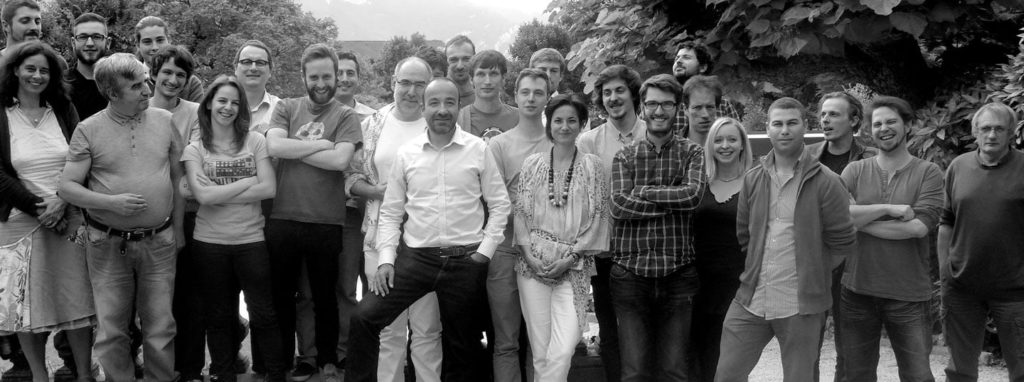
Installation
After purchasing a license, you can be relatively straightforward and straightforward to install all needed software by using the Arturia Software Center. The Arturia Software Center tools also keep the software up to date. Run the tool regularly to get the latest updates.
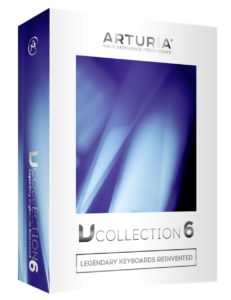
Sound
The new vintage synths are sounding astonishing, and you get some refreshing new soft synthesis and as well the pretty heavily updated synths from the previous version. Arturia’ approach to synths is to model instruments trying to reproduce the actual characteristics of the original hardware while injecting new live with additional functions and effects.
The modeled synthesizer sounds are excellent, pretty close to the original. With the added features you can create sounds that have not been possible with the vintage hardware synths. Arturia has found a way through their proprietary True Analog Emulation to reproduce the sonic qualities of analog synthesizers by recreating hardware components with marvelous detail. Overall there are more than 6000 presets included across all available instruments. With the master preset browser, Arturia calls it Analog Lab you have an easy way to find the sound you need without needing to go through all instruments and load them one by one. Analog Lab has still to fight a bit with a better approach to go through the more than 6000 presets. My view is that this nut is a hard one to crack as you have to provide an easy to use interface to manage all included presets.
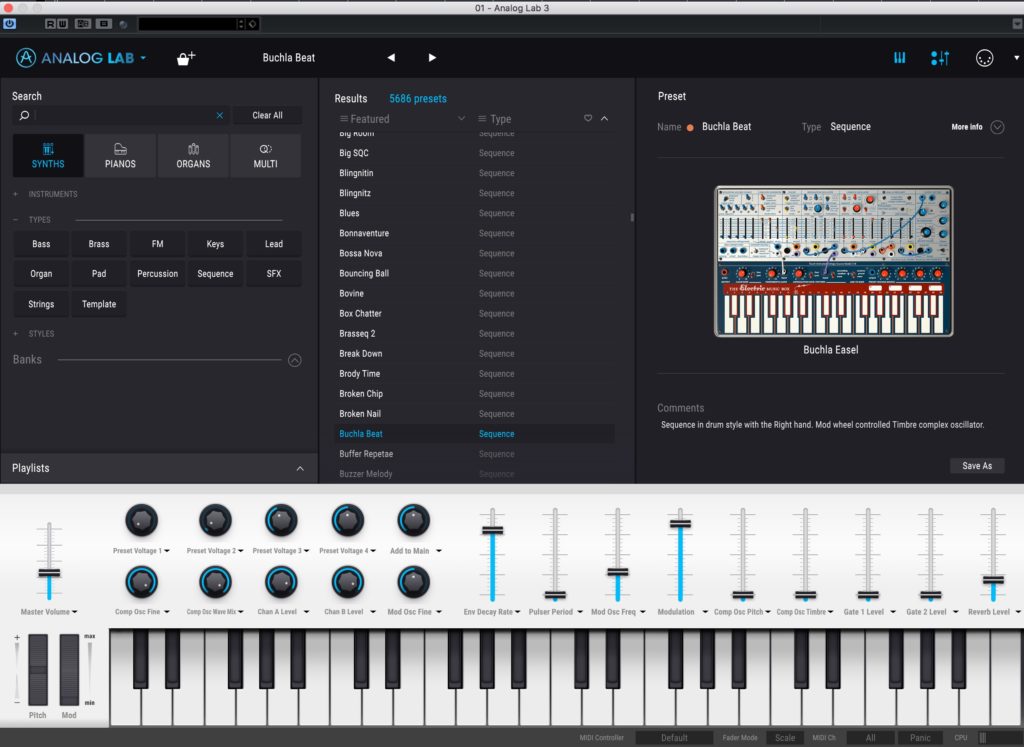

Included are 21 modeled authentic synths, organs, electric pianos. 8 Analog Synthesizers (Buchla Easel V, Mini V, Modular V, Matrix-12 V, Jup-8 V, ARP2600 V, CS-80 V, SEM V) 4 Digital Synthesizers (DX7 V, CMI V, Synclavier V, Prophet V), 12 Pianos Models, 1 String Machine, 3 Electric Pianos (Clavinet V, Stage-73 V, Wurli V), 3 Organs (B-3 V, Farfisa V, VOX Continental V).
Collection 6 promises authentic, detailed sounds through TAE. TAE® is “True Analog Emulation” – Arturia’s exclusive technology aims to reproduce analog oscillators & filters accurately and allows the modeled instrument to add punch and present through soft clipping. Besides the Arturia software enables you to expand the set of features beyond what you could find on the original’s synths.
Analog Lab
Analog Lab gives you instant access to over 6000 selected designer sounds from all 21 vintage keyboards. You can browse the presets by TYPES, BANKS, sonic CHARACTERISTICS, and INSTRUMENTS (crossing categories) or search by name. With the sheer number of presets, I wish that this tool would be more natural to use while recognizing that this is not an easy task.
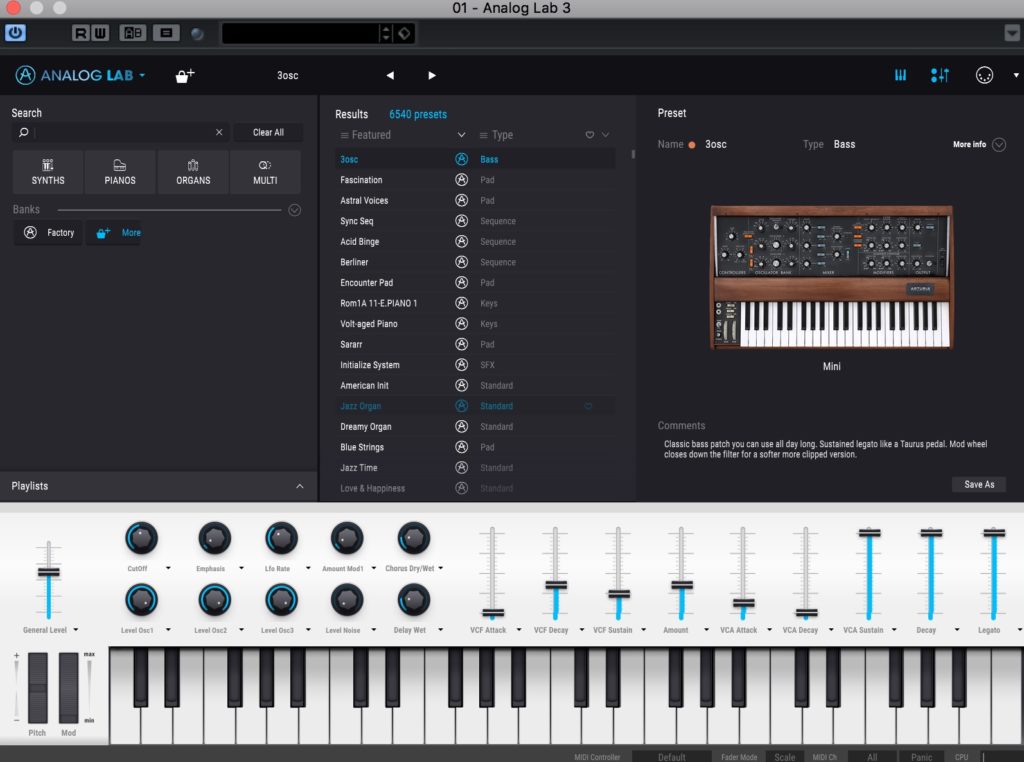
ARP 2600 V3
Arturia’s 2600V or ARP 2600 named after Alan R. Pearlman, whose initials would form the name of ARP Instruments, became interested in instruments for electronic music in 1948. The VST retains the character of the original ARP 2600. It is an extremely convincing and flexible ARP emulation. There are so many extra features you can use to shape the sounds you are generating. If you get confused with the busy interface start with the presets and take it from there. ARP 2600V audible results of the are convinced with the typical ARP-like sounds. It sounds terrific!
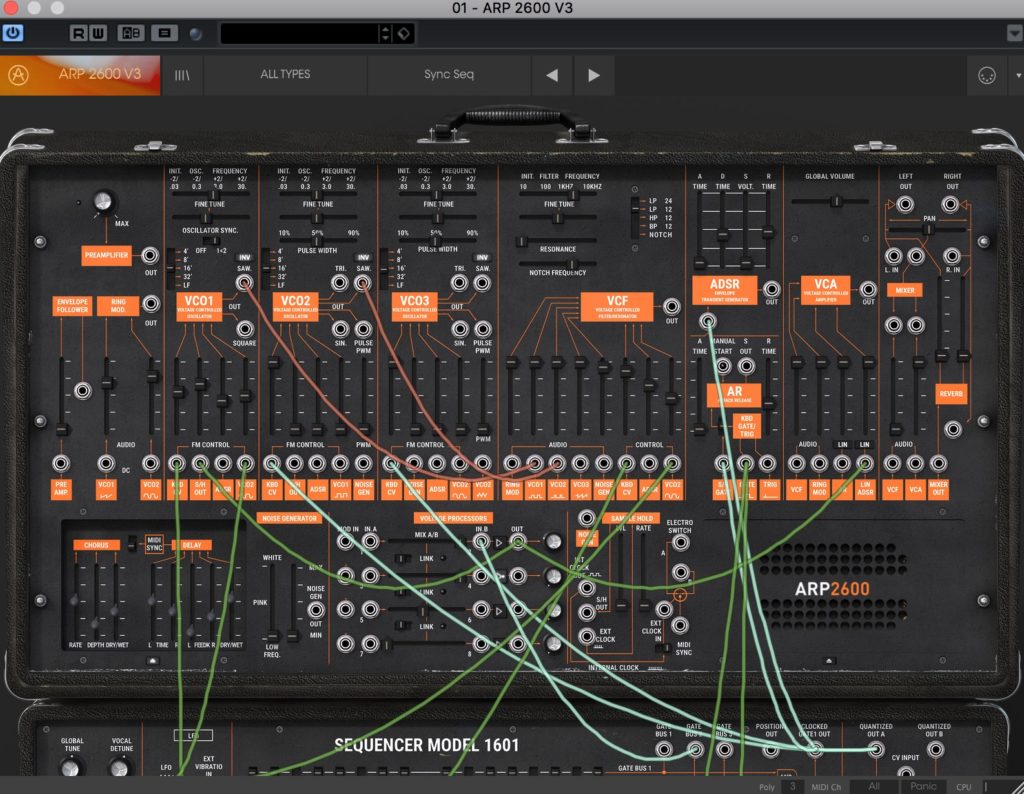
++
B-3
This is an authentic-sounding software simulation of the classic Hammond B-3 tonewheel organ and Leslie rotary speaker combo. Arturia added effect pedals that allow you to mix in analog delay, chorus, flanger, overdrive, and phase effects. B-3 V works well in many compositions and works very well in jazz, gospel, rock, reggae, and R&B.
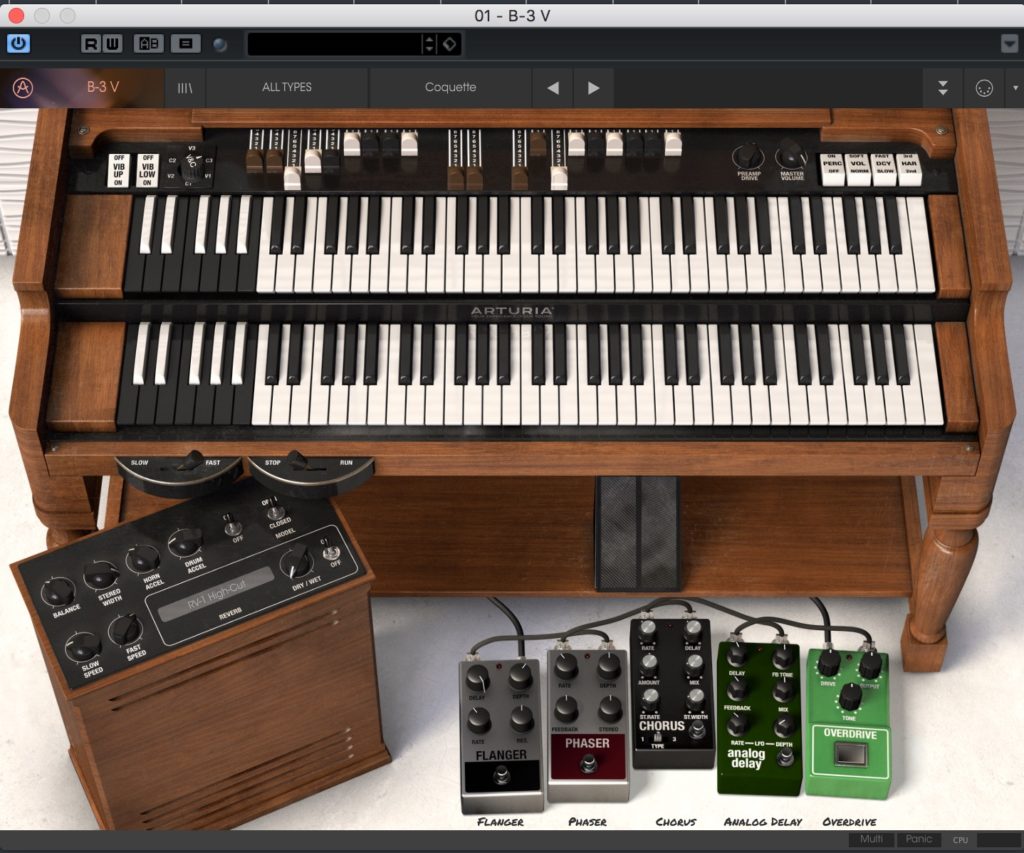
Clavinet V
The original vintage instrument from Hohner back from the mid-60s. Clavinet V is a funky, dynamic great for R&B, rock, pop.
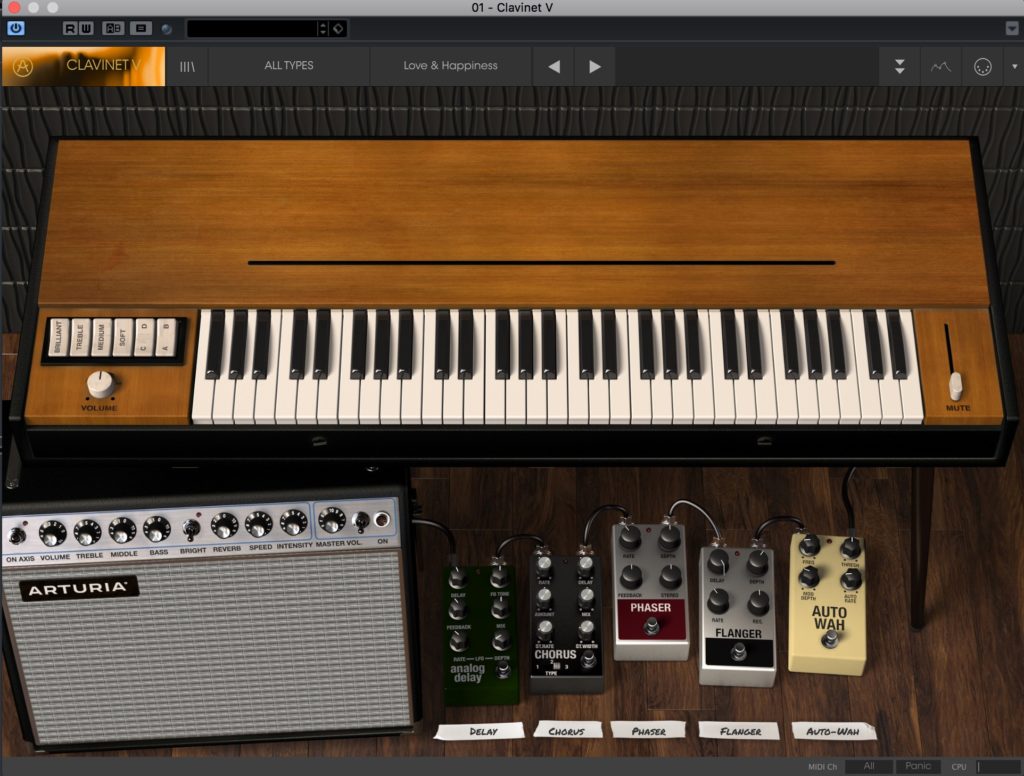
CMI V
This one is modeled after the Fairlight CMI the Godfather of samplers which we did hear in so many pop songs over the last years. At the time a Fairlight CMI was a groundbreaking digital sampler, synthesizer and workstation produced. Used for its original sounds (at around 20k) by Art Of Noise, Stevie Wonder, and Peter Gabriel.
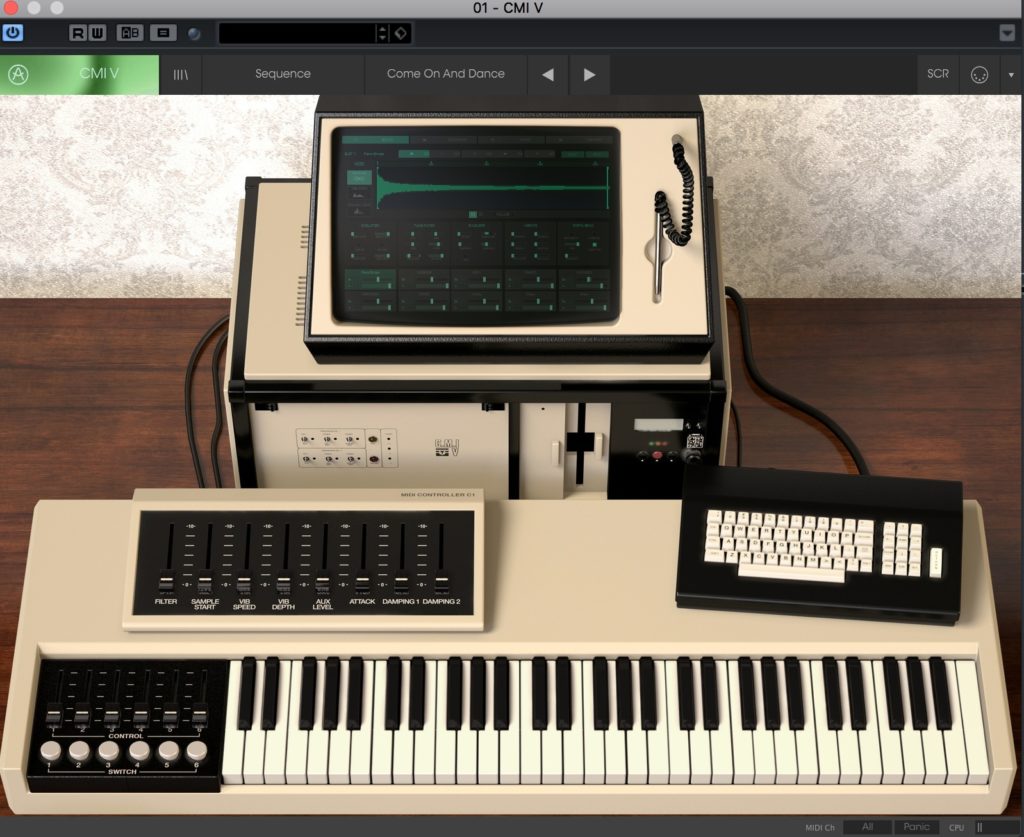
CS-80 V
The modeled CS-80 was a front-runner synthesizer of the 1970s. Many consider the Yamaha CS-80 as the prominent analog poly ever created. Used by ABBA, Electric Light Orchestra, Jean-Michel Jarre, Stevie Wonder, Toto, Vangelis, Ultravox and Peter Gabriel the Yamaha CS-80 was probably one of the most colorful synthesizers created. Arturia modeled all the first parameter of a Yamaha CS-80 (2 oscillators, four filters (high pass, low pass), 2 LFOs, four envelopes, 2 VCAs, one sub-oscillator, one ring modulator, chorus, and tremolo) and included more than 500 presets. The CS-80 is a beautiful synth model significantly by Arturia which allows you without breaking the bank (and spend all your money on eBay) to use one of the most beautiful analog polysynths of all time.
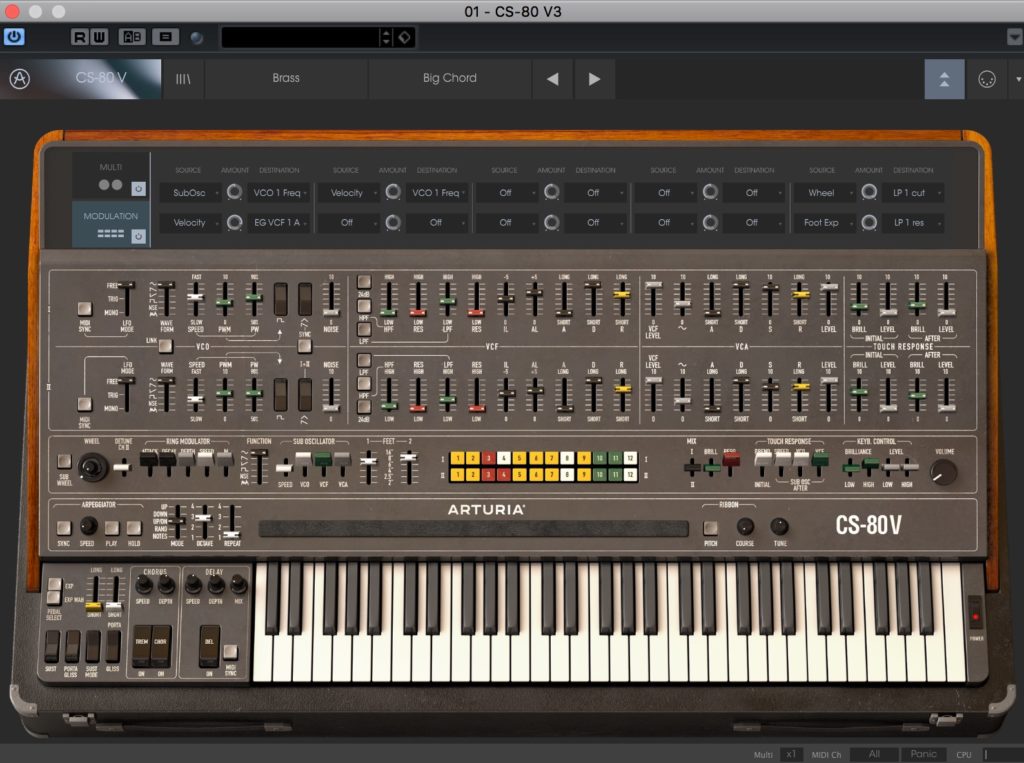
Buchla Easel V
Get your hands on legendary and desired Buchla synthesizer an emulation of the original Buchla Music Easel released in 1973. Arturia model this on at a component-level. To be able to model on a component-level Arturia extensively analysis Buchla Easel hardware down to the electrical circuits. For me the star in the newly added instruments.
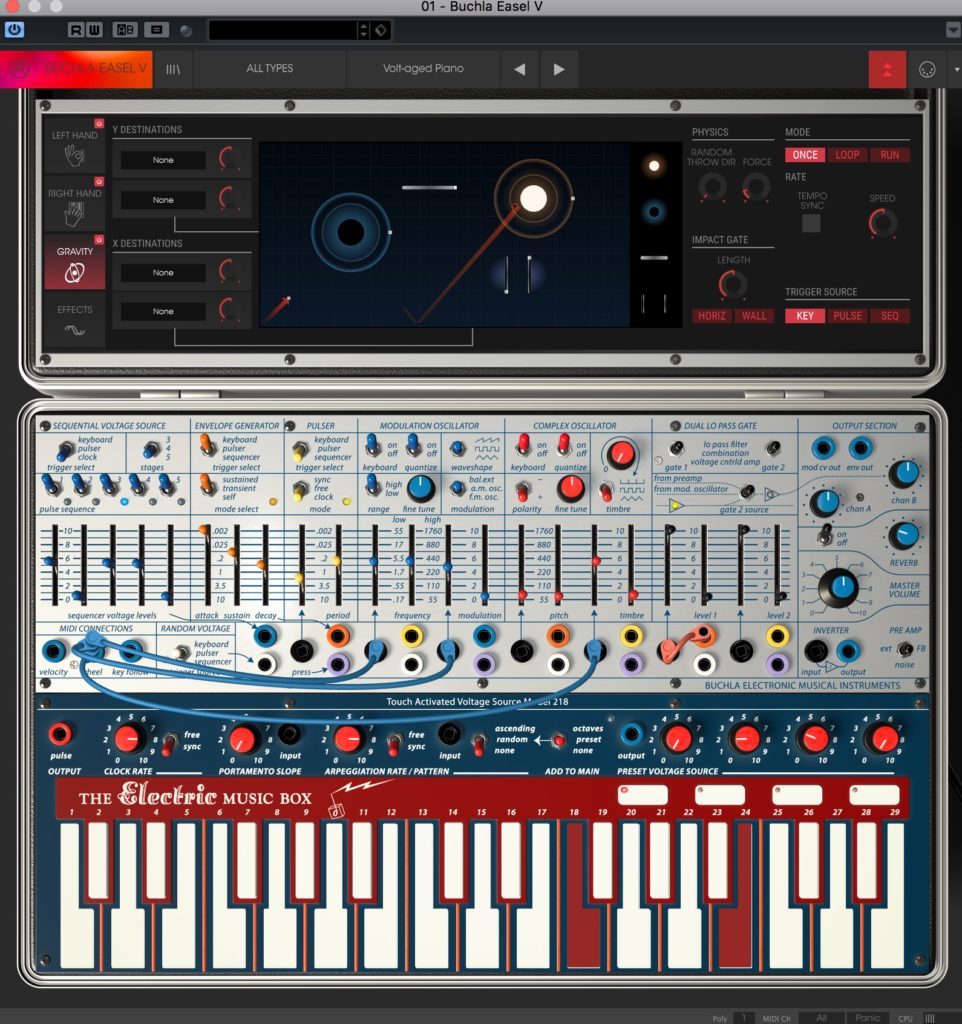
On top, they added newly enhanced functionalities, synchronizable Pulser and Clock, Oscillators quantization which did not exist in the original model. The Gravity Universe is fun more like a game influencing the sound created by game-like physics elements.
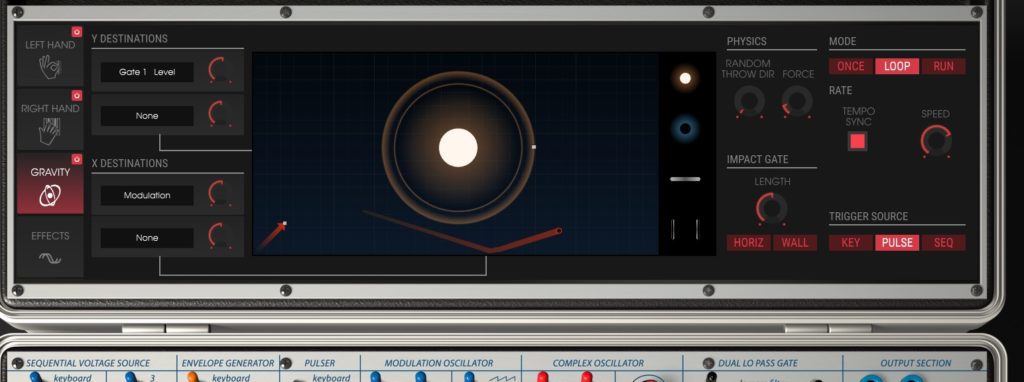
DX7 V
DX7 V is modeling the Yamaha DX-7 without the pain to program it. DX7 V is more straightforward to program and comes with additional functions never available in the vintage synth. Arturia has done a great job in modeling this Yamaha Synth and added valuable new features. Arturia incorporated a modulation matrix, complex, modulations macros, their sequencer & arpeggiator and more.
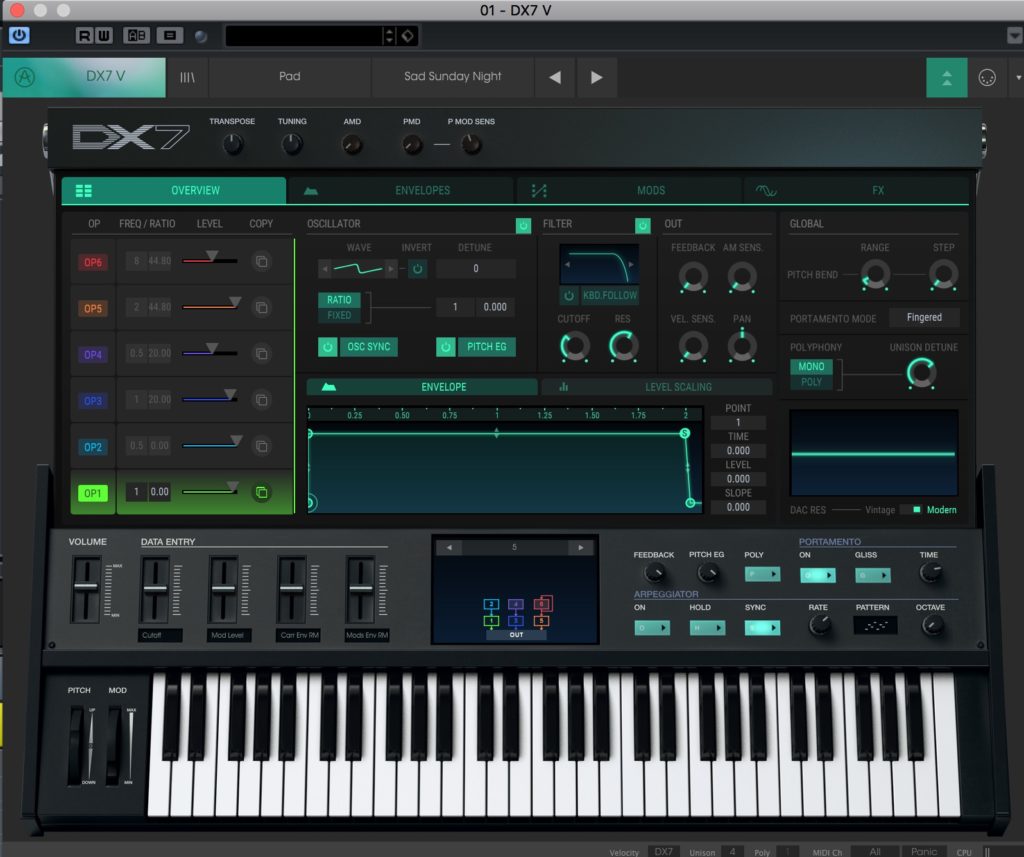
Farfisa V
With the Farfisa V instrument, you can play Farfisa Compact Deluxe electronic organ which manufactured in Italy between 1964-1968, there are 147 presets included which give you different perspectives on a legendary Farfisa and will amaze you with the versatility of this instruments.
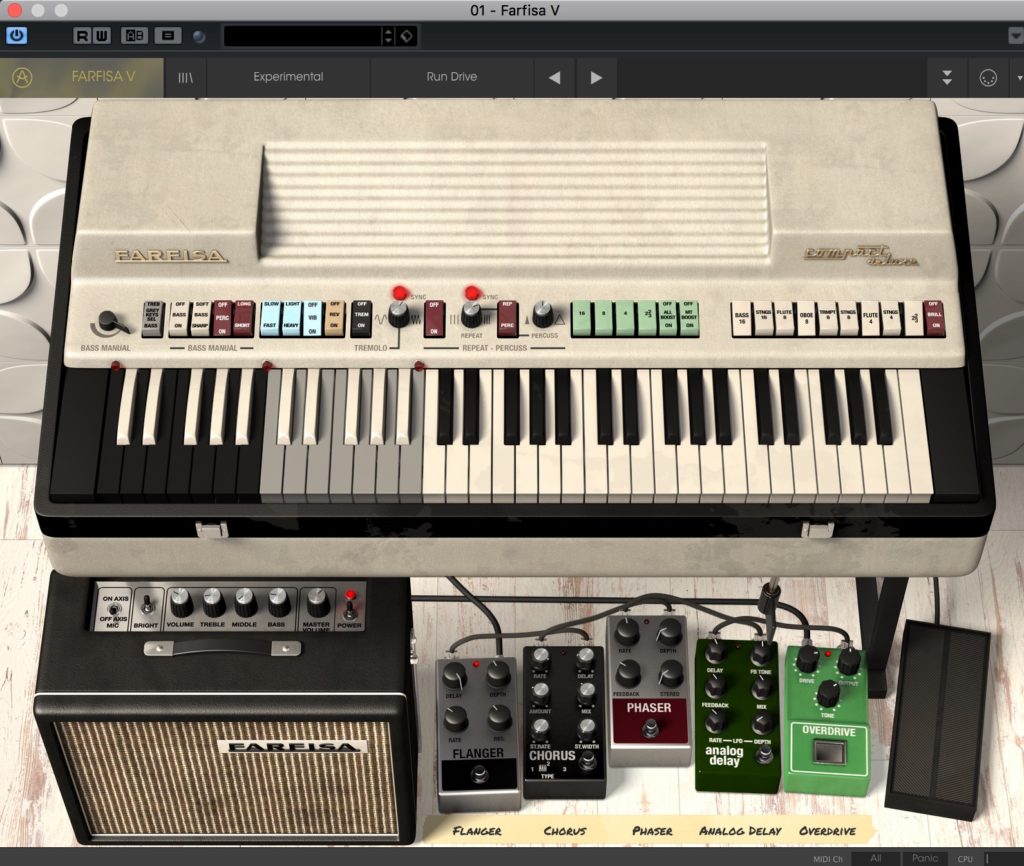
Like with the other included instruments you can further mangle and change the sound created by using the advanced controls (see below)

Jup-8 V
As with Release 5, the Jup-8 V is part of my personal top 3 across all available synth in the V Collection. In addition to the original features, the modeled Roland Jupiter 8 did have Arturia added a sequencer, a Galaxy module where you can create motion based on the different LFOs and additional effects.
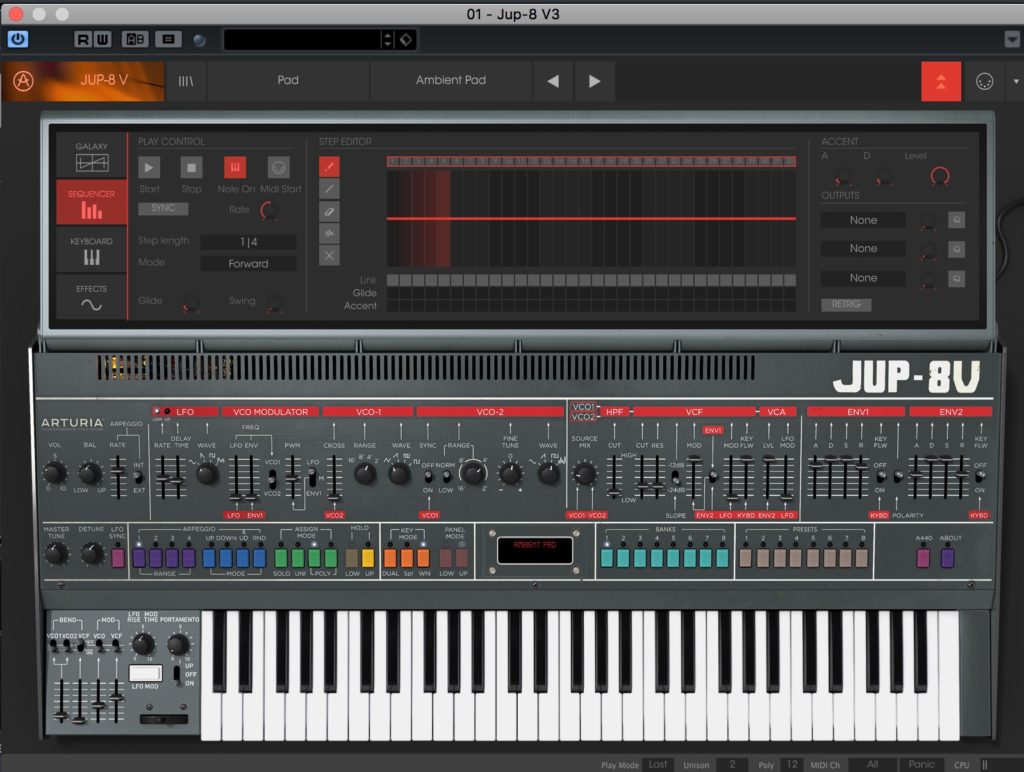
Arturia captured the magic of this classic Roland synth in this software masterpiece. Another of the included synths that allow you to reduce the spend on rather expensive used hardware synths without the need to repair it. Jup-8 V is one of the best software based replicas.
Matrix-12 V
Matrix-12 V modeled after the Oberheim Matrix 12 which has known for his fattest, and roundest sounds. Great for brass, pads, textures or mysterious sound design
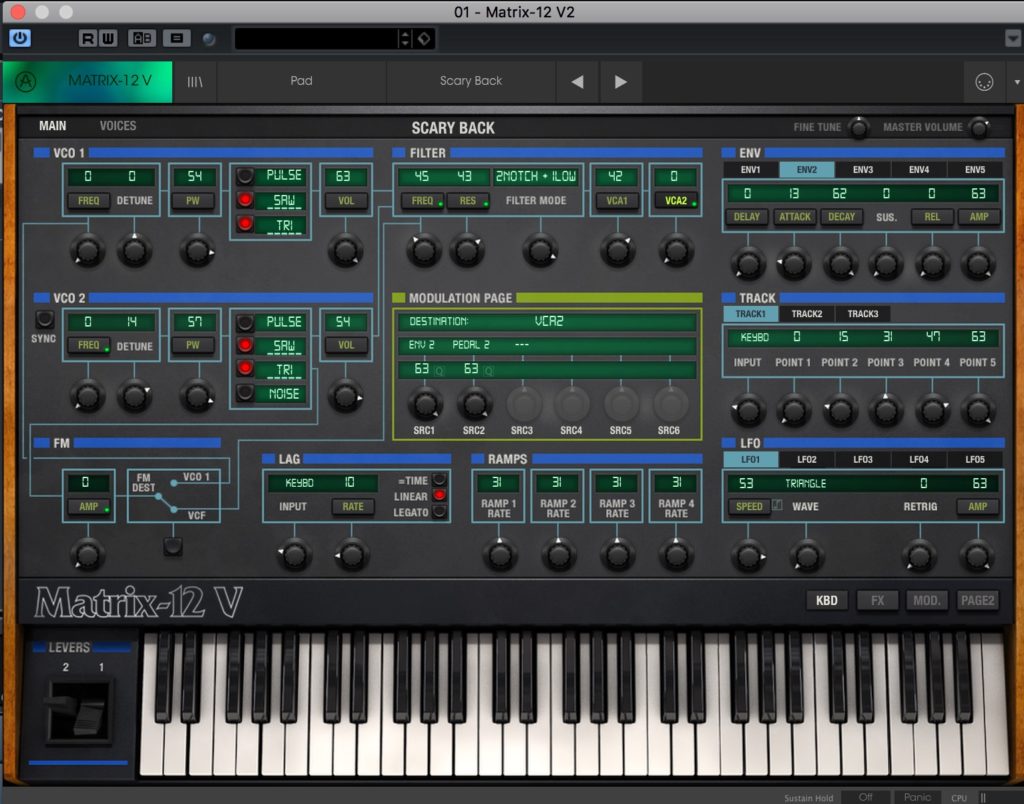
Mini V
The original hardware synth has been played Depeche Mode, Jean-Michel Jarre, Kraftwerk, Tangerine Dream, and others and is known for his lead and bass sounds. The Mini V sounds like the original Minimoog however without the burden of the vintage hardware. You will not need to take this synth like the Minimoog to the hardware doctor. Like other synths, the Mini V goes beyond what a Minimoog could do and provides you with three oscillators but is polyphonic and stereo.
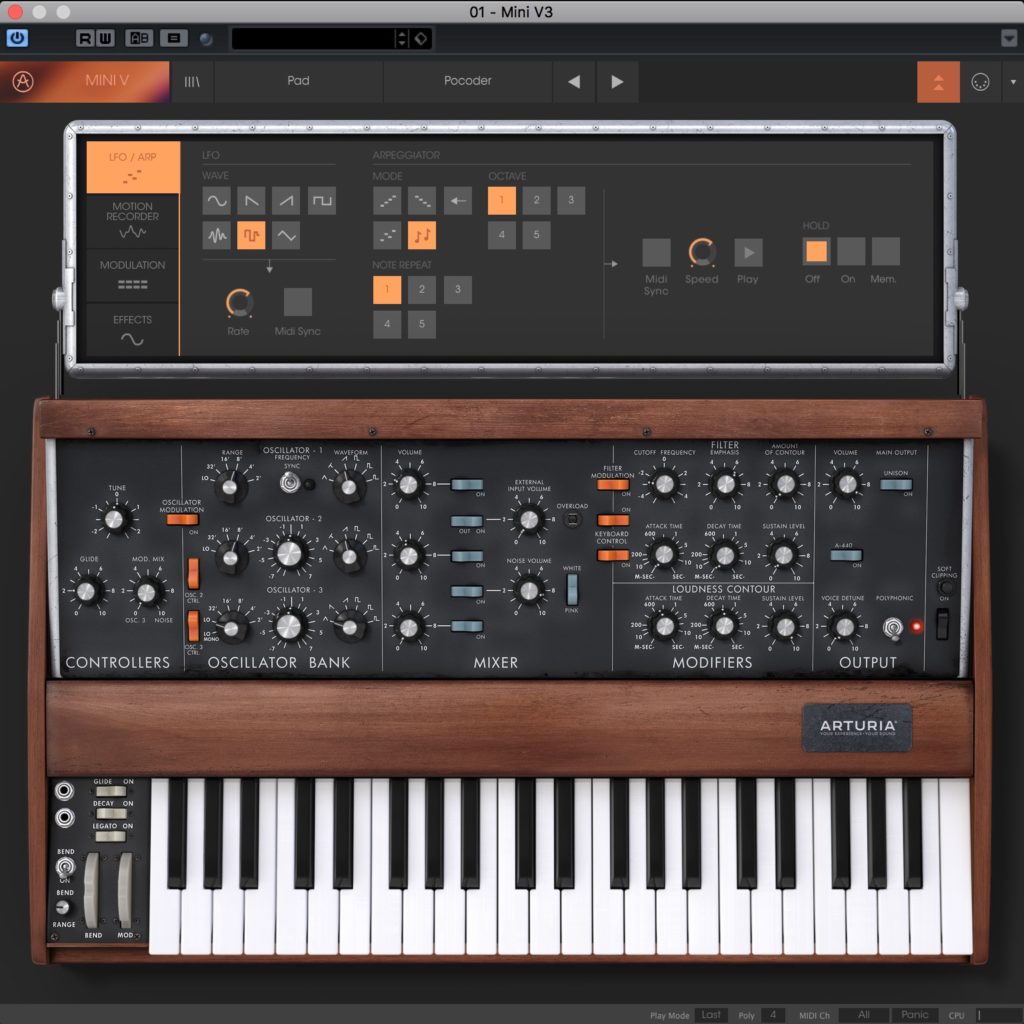
Modular V
It is a software modeled after the Moog Modular. You can start without the investment in a synth wall to experience with a modular synth. Arturia has updated the software synth recently and improved the audio quality and added new modules. To start using the Modular V, you may spend your time in the included presets. If you are preparing yourself for an adventure you can and learn the fundamental concept of a modular synth you will discover the enormous opportunities of sound.
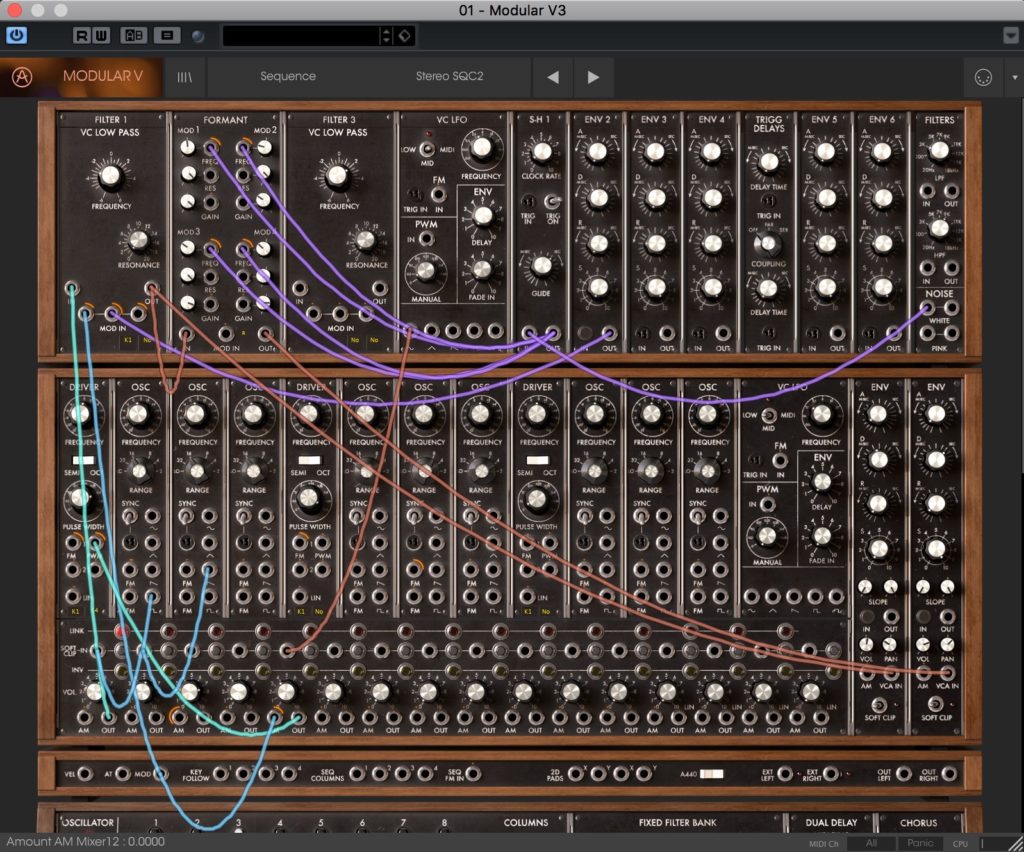
Piano V2
With Piano V you get access to 12 different pianos models that changed to your needs. Some are somewhat exotic as they are modeled after a glass or metal pianos. Overall you have access to Classical Upright, Concert Grand, Glass Grand, Intimate Grand, Japanese Grand, Jazz Upright, Metal Grand, Piano-bar Upright, Plucked Grand, Pop Grand, Pop Upright, and Tack Upright. You can control the microphone setup, used reverb and room, supplement hammer or pedal noises, change the tone by making the sound softer, you can create pad like sounds with some additional effects. The 2nd version of Piano V added three other piano models.
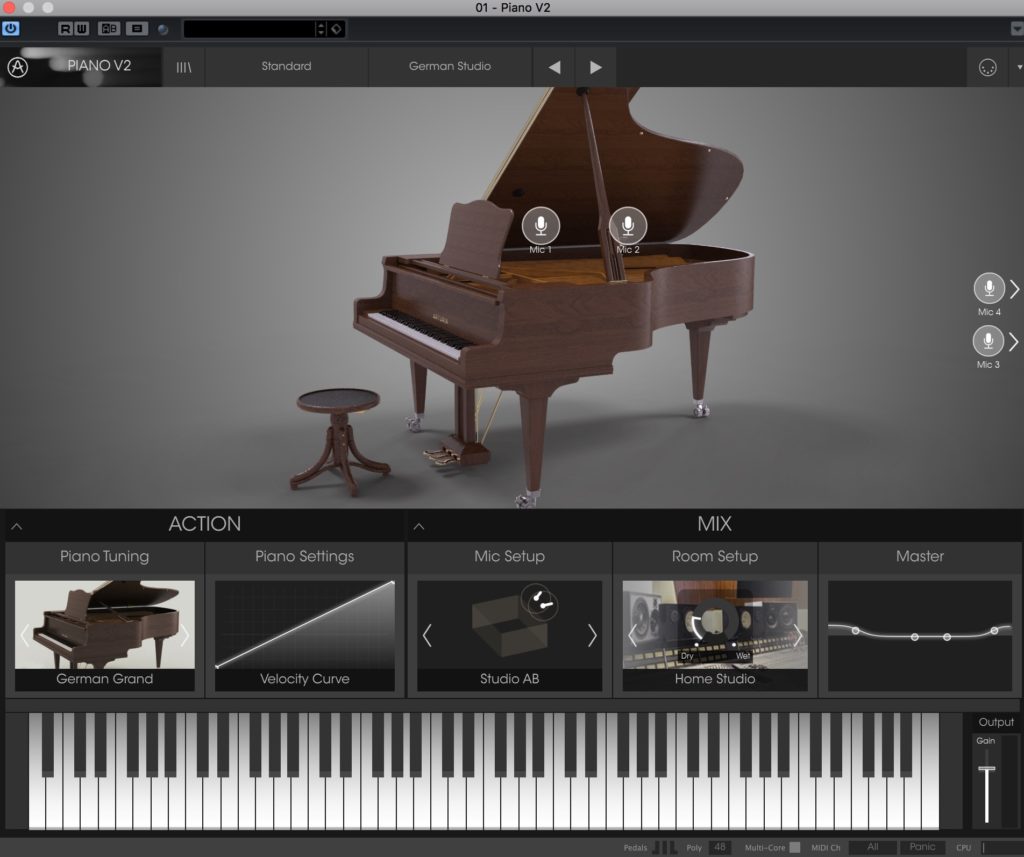
Prophet V
This modeled synth Prophet V emulates the Prophet 5, and Prophet VS is known for its analog warmth and unique sound. You can use both classics in an utterly fabulous hybrid mode.
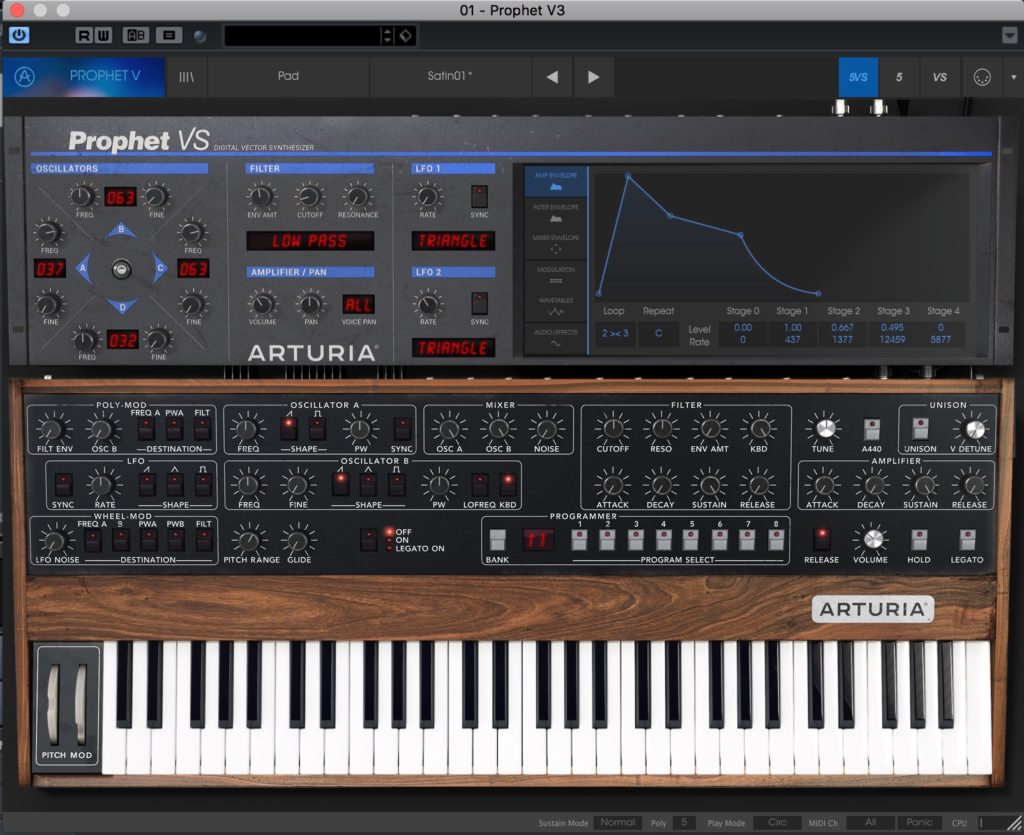
SEM V
It includes all the initial parameters of the and classic Oberheim SEM: two oscillators, each offering sawtooth wave and variable-width pulse wave with PWM, sine wave LFO, 12dB/oct multimode Filter with low-pass, high-pass, band-pass and notch, two ADS envelope generators. Arturia has added new functionality (LFO, Noise, Sub oscillator, on board effects (overdrive, chorus, and delay), Arpeggiator, Portamento). The SEM V is excellent for a solid bass line.

Solina V
Solina V is a classic String Machine which offers additional controls when compared to the original. As in other Arturia products the development team has added features that significantly enhance the synth. The hard this instruments is modeled after is an ARP Solina String Ensemble which has used in many hits in the past. You can recreate the Solina sound or use it as a starting point to come up with new unheard sounds. Shimmering ensemble effect.

Stage-73 V
Stage-73 V is a real sounding simulation of the Stage and Suitcase 73-key electric pianos. Modeled after the tremendous electric pianos from Rhodes. It is a unique shaped Rhodes instrument where other available instruments are sample based. The market penetration with Rhodes soft plugin is however extensive, and you can select out of many possible emulations today.
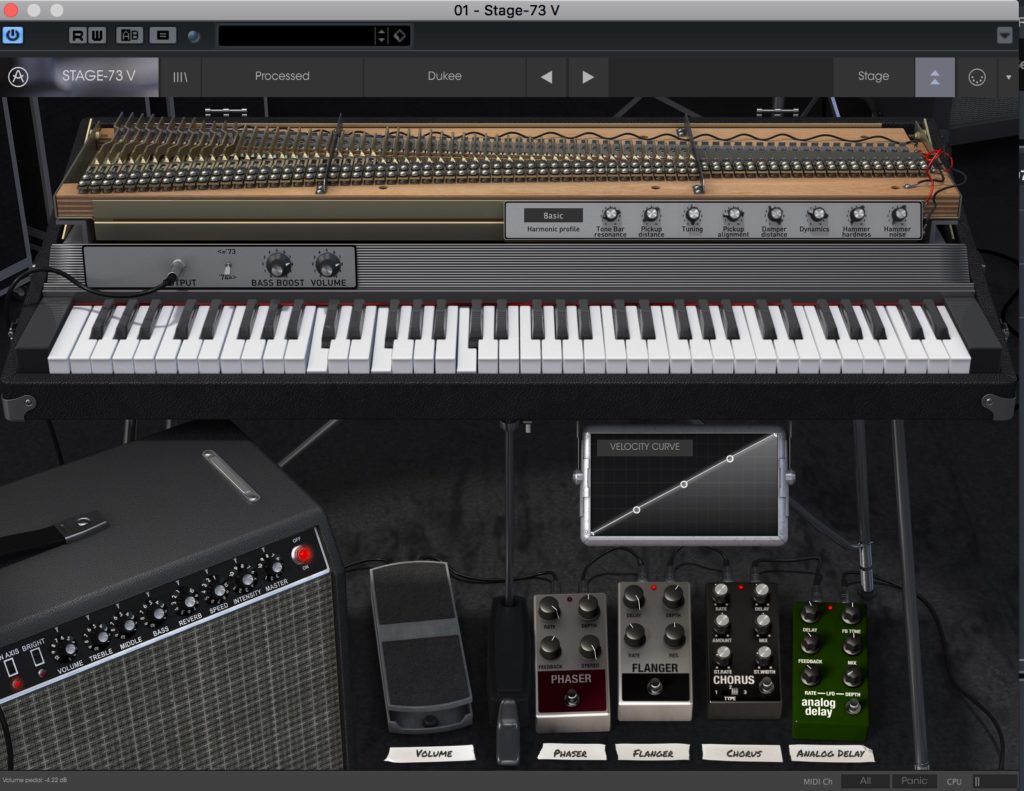
Synclavier V
Recreated in partnership with original programmer Cameron Jones the Synclavier V was created and comes with an additive and FM synthesis. In the old days, a Synclavier was just out of the reach of many musicians due to its price and maintenance effort. However, it has been used in significant music production and was part of much larger studio. Of course, Arturia improved the developed version where possible to allow you to create aggressive leads and long evolving sounds and scapes. Synclavier V promptly went to the top of my preferred Arturia instruments.
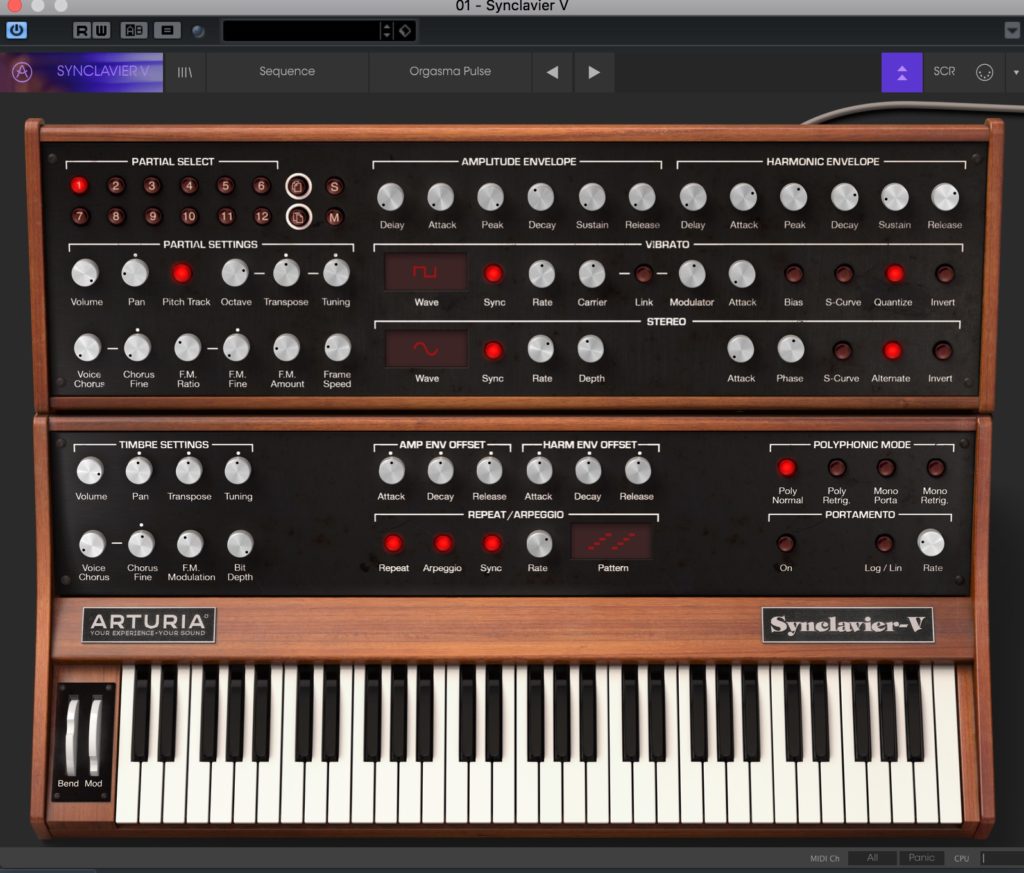
VOX Continental V
Vox V is a 60s classic used in many songs in 1960s time. After you play through the more than 190 included presets I recommend you use the sounds to do some sound mangling and sound design using additional 3rd party plugins.
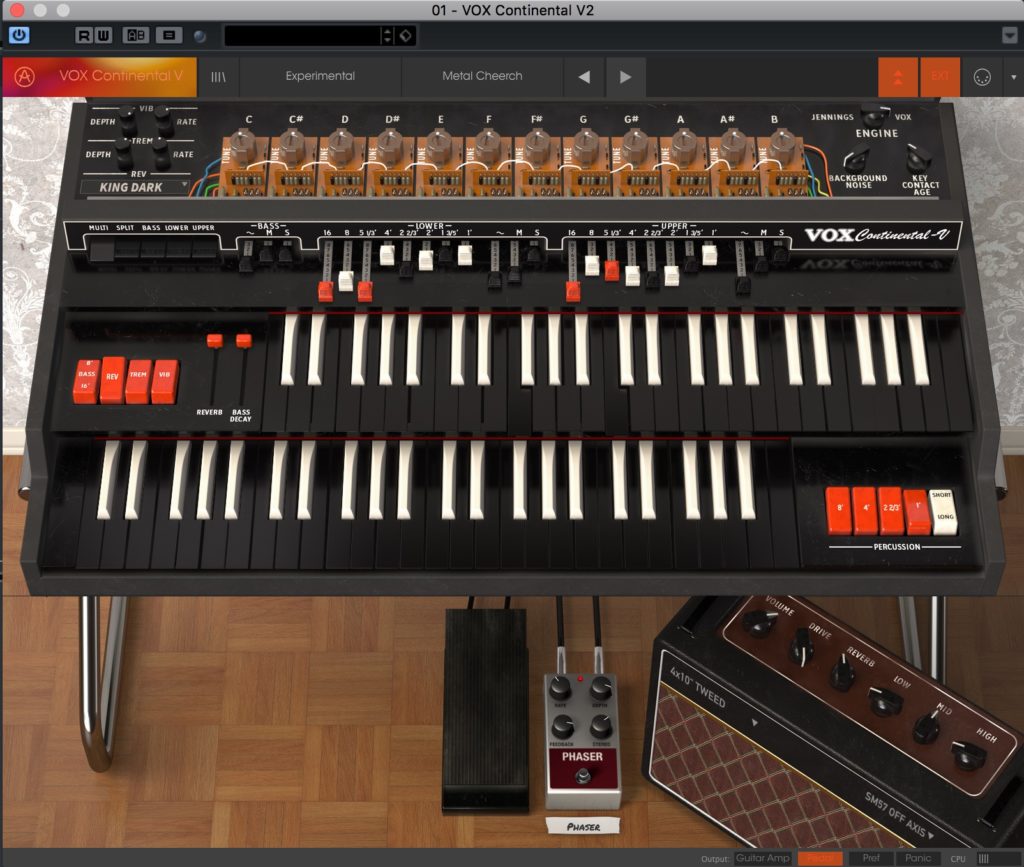
Wurli V
With the Wurli V, you get access to the bright, mellow and hard tone of a Wurlitzer.
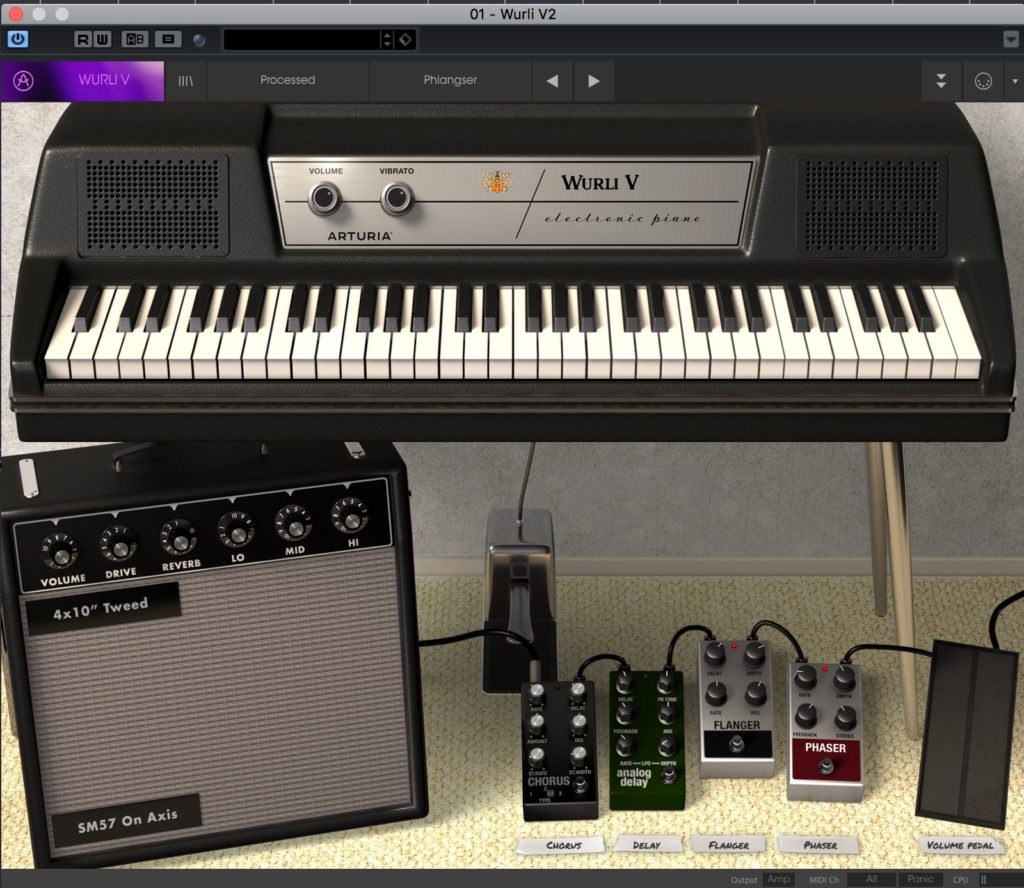
User interface & Usability
The look and feel of each instrument based on the retro look of the modeled hardware. The benefit is that you get the look and feel of such equipment, the drawback is that it is not optimized and you have to learn different interfaces. The interfaces for all instruments is resizable, making it easy to work with any High-Resolution (up to 5K) screen, UHD or Retina.
V Collection is compatible with Native Instruments’ NKS control standard. With the available MIDI Learn functionality you can easily map controls to different MIDI controllers.
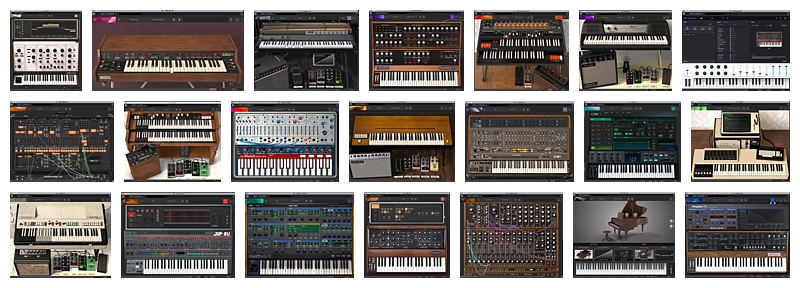
Rating: Five out of five stars
The sound overall in each instrument is remarkably close to its original hardware. I would recommend that you start with this package by browsing through the presets. The included FX and all of the changeable synthesis parameter are a paradise for a sound designer. You have access to additional features that have not been available in the hardware and take the sounds to new realms which have not been possible before. Arturia includes in picked instrument distinct tools like arpeggiators, modulators, motion recorders, effects, and other effects and features not involved in the original hardware.V Collection 6 compared to Version 5 includes an extensive collection of 21 vintage synths of excellent sounding, indeed replicated vintage keyboards through Arturia proprietary modeling algorithm.
One of the killer arguments could be to prevent eBay purchases that result in vintage hardware synth that could work for a long time or be dead on arrival or weeks later which make you cover the additional costs. While the software synth is not always sounding precisely the same, you have a great sound in your arsenal and can use the extra features that have not been available in the hardware.
Analog Lab is a great tool allowing you to browse the presets across all included instruments. Get started here to get to know all synths.
Arturia offers free demos of the V Collection suite, try the different modeled synths yourself before you buy. The newly added Buchla Easel is a very rare and for most not an accessible synth, the most discussed DX7 is available in different other VIs and as an iconic Yamaha DX7 synth should have been added some releases before. Buchla Easel could be a good reason on its own to upgrade if you do own the previous version.



